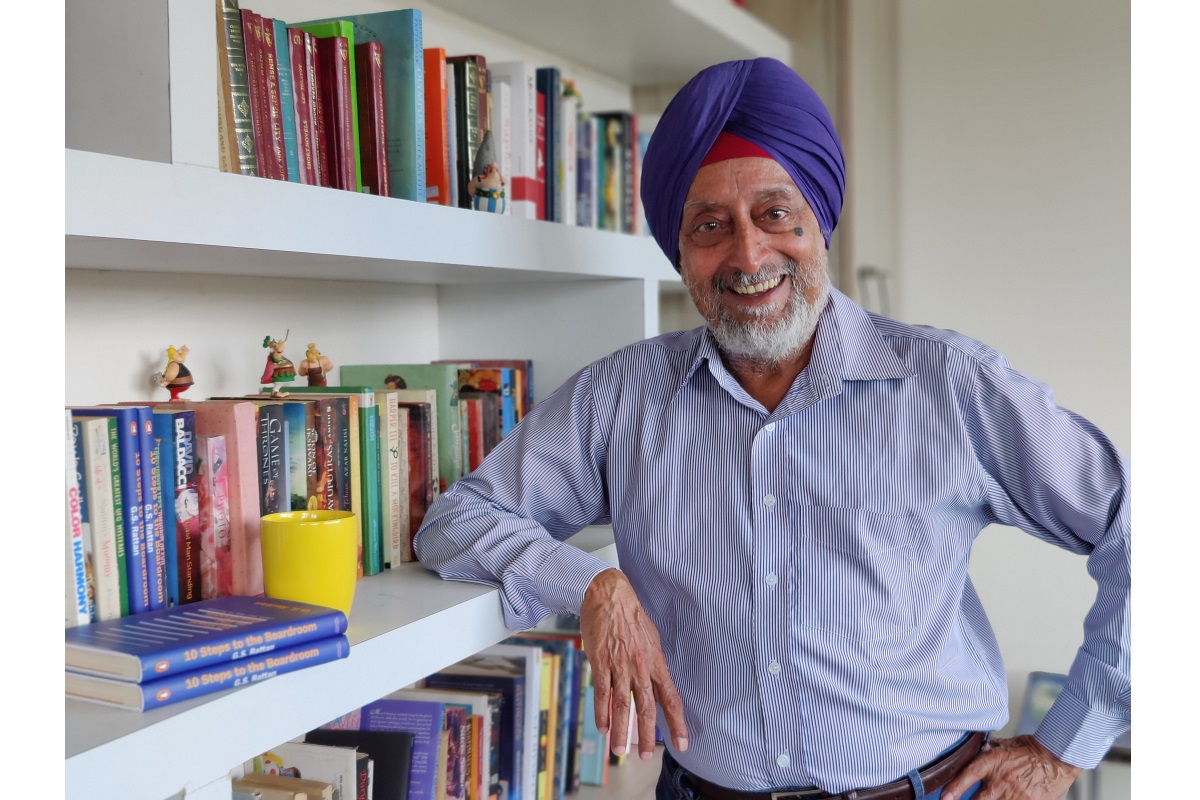Q: With years of service for Tata Bearings and then as a teacher, you’re now starting a new career as an author. Please tell us about your journey and what inspired you to write a non-fiction book.
I have certainly had an interesting career graph spanning several industries in the corporate world and then as a teacher. Starting my career as a fresher from college in the industry itself was a big change in my living and thought process. After a few years in the corporate world where my sole focus was getting my salary and hanging out with my friends, watching the first-day first show of the latest movie, and trying out the latest restaurant in town…I soon realised that I need to plan my career if I wanted to reach somewhere. I set my goal and then stay focused to achieve it. Timely guidance from my seniors at PEC (Punjab Engineering College) and well-wishers gave me the confidence to carve my own path.
During my stint with the Tata Bearings, the young gun in me had a point to prove. I channeled my competitive spirit into the challenging assignments in front of me and it led me to the next level. I voluntarily took up some of these and some were given to me. Each challenge was met with zeal and honed my leadership skills. Each was a step in disguise that moved me up the corporate chain. It also gave me a chance to display my management and technical skills which was a great combination to be included in the leadership team and a go-to person for critical assignments.
Advertisement
While technical skills were a natural fit for me, I worked on my communication skills and mental resilience to come out stronger. Recognising what and where you need help is crucial when you grow in your career. Once you understand that, you can then direct your attention to acing them. My learning attitude was key in my path to reach the top position.
My second inning was as a teacher. This I think was another great decision of my life when I decided to adopt this noble profession of teaching. I was assigned to teach the students technical expertise. However, most of my classes used to end up with me sharing my real-life experiences with the students…whether in using the technology, career growth, or the human interplay involved with it.
And this was the only time the students’ interest was piqued. Slowly, they started asking a lot of questions and debating possibilities. Steadily the empty benches filled up, attendance in my class increased and the enthusiasm of the students went up. The wide gap between the academic syllabus and industry expectations was gaping.
And the feedback I got from them for real-life application of the knowledge was moving. I understood that real-life application of the knowledge was sorely missing. I saw my students wanting to know more about the industry experience, how the theory learnt in school applied to the real world, and did it even matter. I happened to discuss this with my daughter Tarunjeet and she encouraged me to put this in the form of a book that could inspire young managers to reach the top. A workbook of sorts that they can use for their entire career. It evolved from there into a book that I am very proud to have published today at 74.
Q: Please enlighten us on the significance of your new book, and what reactions are you expecting.
The one key message I want to convey to all ambitious executives is that takes you need to plan your career progression very seriously in your life and early on. Opportunities to climb up do not come across very frequently, so prepare yourself well in advance to offer yourself as a prospective candidate to fill up the position. Be a dreamer, a planner, a strategist, and a go-getter to succeed from Day 1.
With my real-life experience, I also want them to understand that failures are a stepping stone to success and the path in front of you might not always be linear. But if you build your confidence, and mental resilience and keep an open mind towards learning, you can cha-cha with whatever fate throws at you against your best-laid plans.
Each chapter is important at a stage in the life of a young executive. Each chapter is to be utilised as a guide to excel in that role and move ahead.
I expect enterprising executives to keep asking themselves the tough questions posed in the book and keep referring to it for the next steps in their growth.
Q: Please tell us about your greatest experience while you were exploring this book.
While penning down 10 Steps to the Boardroom, I was at times overwhelmed by the journey down memory lane as I captured events, the sequence of their happenings, and the amount of impact each incident left on me as it pushed me to change and improve myself.
Recapturing the moments of meeting corporate legends like Sh. JRD Tata and Sh. Ratan Tata during my working at Tata Bearings and the impact they left on me was far-reaching. Along the way mentors like Harsh Jha, SL Deoras, Suren Rao, B Muthuraman, Dr. JJ Irani, and Dr. T. Mukherjee as well as several peers who helped shape who I am and encouraged me to live up to my full potential. When I actually sat down to capture their impact on my life in words, it was often overwhelming. It filled my heart with gratitude.
As I did that the strongest pillar of my life – my life partner Verjeet’s support became more evident and crucial to my success. I always knew it but as I put chapter after chapter I realised I could not have done this without her unconditional support. It made me realise that to achieve true success in life you need to balance both work and personal life. This cannot be achieved if both the partners are not invested in the success. Verjeet took charge of the home team and managed both with a steady hand.
This is another valuable lesson that I want to pass on to the next generation of managers. Your success is not yours alone. Your life partner, mentors, and bosses (in that order) are key drivers for your growth.
Q: According to you, how important is it for a person to choose his/her career as per his/her choice. Do you believe that career choices based on preferences are more likely to be successful or a person should go with the chance? The battle between choice and chance is a game-changer for anyone, what would be your comment on that.
The battle between Choice and Chance is always a game-changer. Every career journey starts with a choice made by you. You choose to enter a specific course and take up a specific job in a specific city. That was your choice. Chance happens along the way. In my experience, I have always relied on choices and hard work with an eye out for chances. All your hard/smart work will put you in a place where chances will be aplenty. Then it is up to you to pick the ones that best suit your career path. That is your choice.
I took a huge change and a big leap of faith when I took up a job in the far eastern part of our country from a bustling city in Gujarat because I saw a chance to prove my merit and take up a challenge that was unique. That choice on the chance made all the difference.
Q: You’ve experience in teaching, what difference do you see in students of the current generation regarding their career choices to what the scenario was in your times.
There is a marked difference between the students of the present generation and of my time. The present-day students are much more aware of their career choices and the many options to meet their goals. There are also multiple career choices unlike ours where there were a few preferred streams and fewer corporates to work with. There are so many more things one can do today and carve a career path that is completely unique and adventurous. It’s so exciting to be a graduate of today’s generation.
Today however with the excess of mediums sharing information about career options, upskilling, learning, and more, what is missing is knowledge and wisdom to make sense of it. Information consumed is not necessarily knowledge. This is where I encourage a lot of my students to do two key things. One, seek mentorship and counsel that will help them make sense of this information. Something that will help them align information and leverage them as energisers for their dream. Second, spend time alone with yourself and your thoughts. The more you think without the distraction of technology or entertainment; you will discover what you want to do …your true calling. That is only achieved by inner reflection. In a world full of distractions, be calm. That will be your winning ace.
Advertisement












